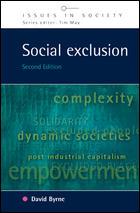Social exclusion.
David Byrne, Open University Press, Maidenhead, UK, junho 2005

‘Social Exclusion’ is a key phrase in social policy and social politics across most of contemporary Europe. It is a description of the condition of individuals, households, neighbourhoods, ethnic and other ‘identity’ groups, who can be identified as being excluded from society.
The second edition of this widely read book explores developments in social theory, social experience and social policy in relation to Social Exclusion. The first part examines the origins of the term and implications of the difference between the ideas of ‘exclusion’, ‘underclass’, ‘residuum’ and related concepts. The discussion is informed by the application of Complexity Theory. In the updated second part, the theoretical account is developed through a detailed review of the dynamics of individual lives in a changing social order. Income equality, spatial division, and exclusion in relation to health, education and cultural provision and processes are examined in a range of societies in Europe and North America.
The last part contains a new chapter outlining the content and impact of national and international policies which have been specifically developed to address issues of exclusion.
This is important reading for students on social sciences courses including sociology, social theory and social policy.
